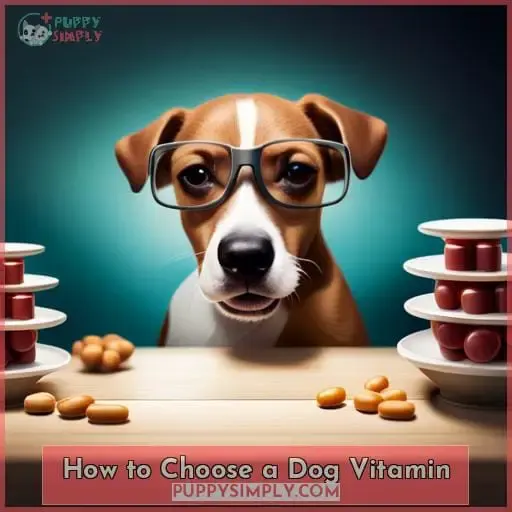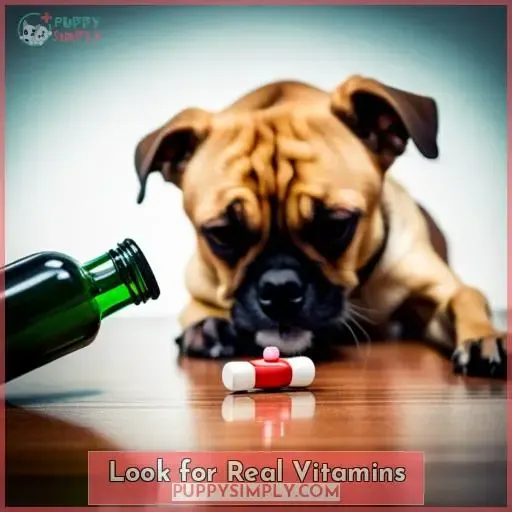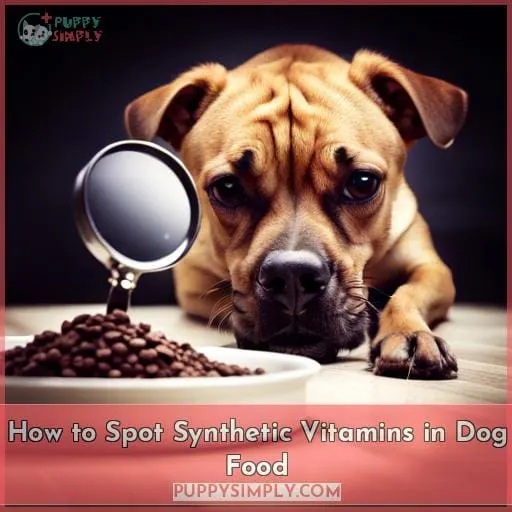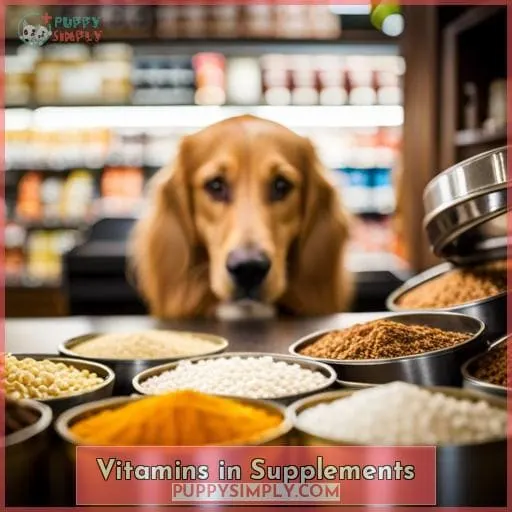This site is supported by our readers. We may earn a commission, at no cost to you, if you purchase through links.
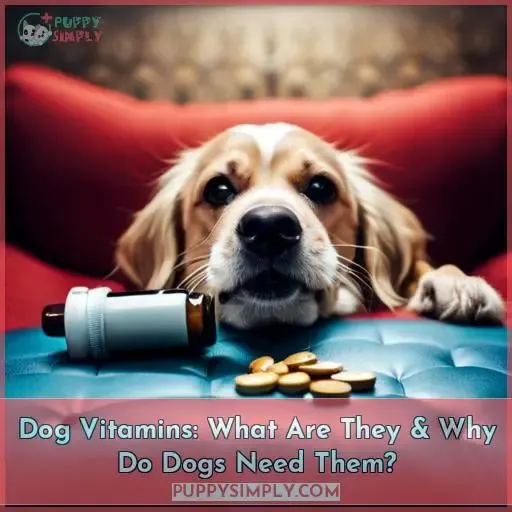 Dog vitamins are a hot topic, but do your pooch really need them? Let’s take a closer look at what dog vitamins are and why your dog may or may not need them.
Dog vitamins are a hot topic, but do your pooch really need them? Let’s take a closer look at what dog vitamins are and why your dog may or may not need them.
Dog vitamins are a type of nutritional supplement that is designed to provide your dog with essential nutrients that they may not be getting from their diet. These nutrients can include vitamins, minerals, and other compounds that are important for your dog’s overall health and well-being.
There are a number of reasons why your dog may need vitamins. For example, if your dog is eating a diet that is not nutritionally balanced, they may not be getting the nutrients they need. Additionally, dogs who are sick or who are undergoing certain medical treatments may also need vitamins to help them recover.
However, it is important to note that not all dogs need vitamins. If your dog is healthy and is eating a well-balanced diet, they may not need any additional vitamins.
So, how do you know if your dog needs vitamins? The best way to determine if your dog needs vitamins is to talk to your veterinarian. Your veterinarian can assess your dog’s individual needs and recommend a course of action, which may or may not include giving your dog vitamins.
Table Of Contents
- Key Takeaways
- What Are Vitamins?
- Do Dogs Need Vitamins or Supplements?
- Are There Risks Associated With Dog Vitamins?
- How to Choose a Dog Vitamin
- Look for Real Vitamins
- How to Spot Synthetic Vitamins in Dog Food
- Food Label Examples
- Vitamins in Supplements
- NuVet Labs
- NuVet Labs Guarantee
- Frequently Asked Questions (FAQs)
- Conclusion
Key Takeaways
- Talk to your veterinarian about what vitamins your dog needs.
- Stick with a veterinary-approved vitamin supplement or one specifically made for dogs.
- Check the label to make sure the vitamin contains the appropriate amount of vitamins.
- Be aware of the risks of dog vitamins, including side effects, overdose, toxicity, long-term use, and interactions with other medications.
What Are Vitamins?
Vitamins are organic compounds that are necessary for sustain life.
Dogs need vitamins, too, although it’s very important that we realize they may need them in different amounts than people do.
The 8 essential vitamins for dogs are:
A, B-complex, C, D, E, K, and choline.
Vitamin A
Vitamin A is responsible for:
- Growth
- Fetal development
- Immune function
- Cell function in your dog.
B Vitamins
In addition to vitamin A, your dog also needs B vitamins, which are a group of important vitamins that play a role in your dog’s health.
- B vitamins help with energy metabolism.
- B vitamins help with cell growth.
- B vitamins help with the nervous system.
Vitamin C
B vitamins are important.
Vitamin C is an important antioxidant.
Vitamin D
Vitamin D allows your dog’s body to balance minerals like phosphorous and calcium for healthy bone growth.
Vitamin E
Vitamin E is one of your dog’s defenses against oxidative damage.
Vitamin K
You need to ensure your dog gets enough vitamin K1 and K2 for proper blood clotting.
Choline
Choline is a necessary nutrient for your dog’s cell health.
Do Dogs Need Vitamins or Supplements?
Dogs fed an appropriate commercial diet shouldn’t require vitamin supplements unless recommended otherwise by a veterinarian.
Here are 3 things to keep in mind when choosing a dog vitamin:
- Talk to your vet about what, if any, vitamins and supplements your dog needs.
- Stick with a veterinary vitamin supplement or one specifically made for dogs.
- Always check the label to make sure the vitamin contains the appropriate amount of the vitamins your dog needs.
Are There Risks Associated With Dog Vitamins?
While dogs fed an appropriate commercial diet shouldn’t require vitamin supplements, there are a number of risks associated with dog vitamins, including:
- Side effects
- Overdose
- Toxicity
- Long-term use
- Interactions with other medications
How to Choose a Dog Vitamin
The best way to choose a dog vitamin is to talk to your veterinarian.
Talk to your vet about the appropriate vitamin dosage for your dog and make sure to stick with a veterinary vitamin supplement or one specifically made for dogs.
Synthetic Vitamins
What are the differences between synthetic and natural vitamins for dogs, and why is it important to choose a product that contains whole food vitamins?
Natural vitamins are found in food, while synthetic vitamins are made in a lab.
Synthetic vitamins aren’t as bioavailable as natural vitamins and can be dangerous in high doses.
Whole food vitamins are better absorbed by the body and are less likely to cause side effects.
Natural Vitamins
Your best bet is to look for a supplement that includes whole food vitamins instead of their synthetic counterparts.
Whole food vitamins are more bioavailable, have fewer side effects, and are less expensive than synthetic vitamins.
Look for Real Vitamins
Once you’ve talked to your vet and decided that your dog needs a vitamin supplement, look for real vitamins.
Natural vitamins are more absorbable than synthetic vitamins and are less likely to cause harm.
Look for whole foods that don’t rely on synthetic vitamins and avoid supplements that are made in China or India.
How to Spot Synthetic Vitamins in Dog Food
Many commercial dog foods contain synthetic vitamins, which aren’t as bioavailable as natural vitamins and can be harmful to your dog.
Look for fresh whole foods that don’t rely on synthetic vitamins, or look for a supplement that includes whole food vitamins instead of their synthetic counterparts.
Vitamin B-1
Look for whole food vitamin B-1 instead of synthetic vitamin B-1 in your dog’s food.
- Coal tar derivatives
- Hydrochloric acid
- Acetonitrile with ammonia
Vitamin B-2
Vitamin B-2 is another synthetic vitamin that’s often found in dog food.
| Natural Form | Synthetic Form |
|---|
Vitamin B-3
Synthetic vitamin B-3 is made from coal tar derivatives.
Benefits:
- Niacin helps with energy production, skin health, and cognitive function.
Side effects:
- High doses can cause flushing, nausea, and liver damage.
Dosage:
- The recommended daily intake for niacin is 14-16mg for dogs.
Food sources:
- Niacin is found in meat, fish, poultry, eggs, and fortified cereals.
How to test for deficiency:
- A deficiency can be tested for with a blood test.
Vitamin B-5
Your dog’s food may contain synthetic vitamin B-5, which isn’t as bioavailable as natural vitamin B-5.
| Natural Vitamin B-5 | Synthetic Vitamin B-5 |
|---|---|
| Supports skin health | May cause skin problems |
| Helps with energy production | May cause fatigue |
| Promotes healthy hair | May cause hair loss |
| Boosts the immune system | May suppress the immune system |
| Aids in wound healing | May delay wound healing |
Food Label Examples
Now that you know how to spot synthetic vitamins in dog food, let’s take a closer look at some food label examples.
When reading the labels of dog foods and supplements, keep an eye out for key ingredients like:
- Vitamin A
- Fish oil (a source of omega-3 fatty acids)
- Vitamin D
- Chelated minerals (which are more easily absorbed by your dog’s body)
- Whole food multivitamins
These are indicators that the product contains important nutrients that can benefit your furry friend.
Remember to always check the label for specific amounts of these vitamins and minerals to ensure they meet your dog’s needs.
Vitamins in Supplements
A supplement that includes whole food vitamins instead of their synthetic counterparts is a good option for your dog.
- Whole food vitamins are more bioavailable than synthetic vitamins.
- Whole food vitamins are less likely to cause side effects.
- Whole food vitamins are more likely to provide the benefits you’re looking for.
- Whole food vitamins are less toxic than synthetic vitamins.
NuVet Labs
NuVet Labs is a trusted company that manufactures and sells high-quality, guaranteed safe and natural vitamins and supplements for dogs. Their products are formulated with the help of leading veterinarians and animal nutritionists, and are made with the finest natural ingredients.
NuVet Labs Guarantee
With NuVet Labs, you can be confident that your dog is getting the best possible vitamins and supplements.
Our products are made with the highest quality ingredients, backed by a 100% satisfaction guarantee.
We also offer free shipping and third-party testing to ensure that our products meet the highest quality standards.
Frequently Asked Questions (FAQs)
What are the different types of vitamins that dogs need?
Dogs need:
- Vitamin A
- The B vitamins
- Vitamin C
- Vitamin D
- Vitamin E
- Vitamin K
- Choline
Talk to your vet about the right vitamins and supplements for your dog.
How much of each vitamin does my dog need?
To ensure your dog gets the right amount of vitamins, consult with a veterinarian.
They’ll provide guidance on dosage and recommend veterinary or dog-specific supplements.
What are the best sources of vitamins for dogs?
The best sources of vitamins for dogs are:
- Fresh whole foods, such as fruits, vegetables, and meats.
- You can also look for a supplement that includes whole food vitamins instead of their synthetic counterparts.
What are the risks of giving my dog too many vitamins?
Too many vitamins can cause:
- Dehydration
- Joint pain
- May even harm your dog’s blood vessels.
Talk to your vet before giving your dog any supplements.
What are the best dog vitamins on the market?
The best dog vitamins on the market are those that are:
- Formulated with whole food vitamins
- Made with natural ingredients
Conclusion
While dog vitamins can be beneficial for some dogs, it’s important to speak to your veterinarian before giving your dog any supplements to ensure that they’re getting the right nutrients in the right amounts.




